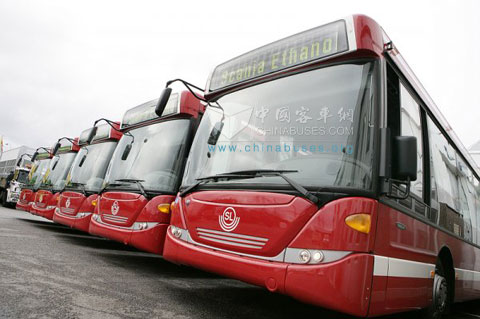Scania is delivering 85 ethanol-powered buses to Nobina, which operates on behalf of the Stockholm regional public transport company, Storstockholms Lokaltrafik (SL). Ethanol buses will help SL fulfil its decision to invest only in buses that operate on renewable fuels starting in 2010. The order includes buses for city, suburban and regional traffic to be stationed at SL’s depots in Bromma, Tyresö and Södertälje outside central Stockholm.

Scania Ethanol bus
Deliveries will begin in August 2010. The buses will be equipped with Scania’s third generation five-cylinder 270 hp ethanol diesel engines, which meet Euro 5 and EEV emission standards.
Scania has more than 20 years of experience with ethanol buses. The company ha delivered a total of about 700 ethanol buses, more than 600 of them to Swedish cities. In recent years, Scania has also delivered ethanol buses for commercial service in Great Britain, Spain, Italy, Belgium, Norway and elsewhere.
Stockholm, the capital of Sweden, has the world’s largest fleet of ethanol buses, and as recently as during the past year, Scania delivered 85 ethanol-powered articulated buses for operation in SL’s service area.
SL’s owner, the Stockholm County Council, has set a target that at least 50 percent of all passenger transport in its territory should occur using renewable fuels by 2012. At the end of 2009, the figure was nearly 30 percent.
Ethanol accounts for around 90 percent of renewable fuel vehicles available today. It is themost cost-effective such fuel in the market in terms of availability, infrastructure and accessto tried-and-tested technology.
Compared to a conventional diesel engine, ethanol-powered vehicles can reduce fossil carbon dioxide emissions by up to 90 percent.